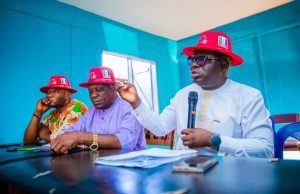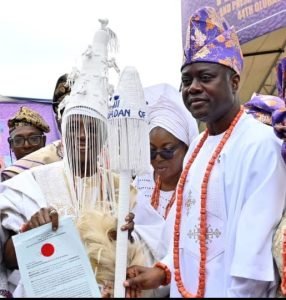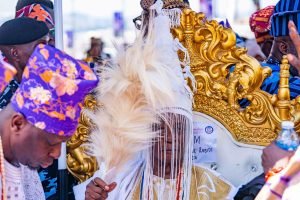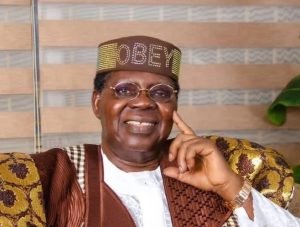Ekiti Guber: Between Campaign Merchandising And Costs Of Disinformation
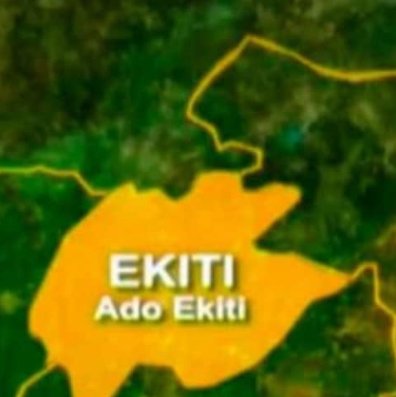
By Wole Olujobi
After a long lull in political marketing in Ekiti State following the assumption of office by Governor Biodun Abayomi Oyebanji on October 16, 2022, the seasonal political trading is now on the upswing as partisans race across the field ahead of the June 20, 2026 governorship election in the state.
I had in a recent essay drawn attention to the need to make Ekiti State governorship election campaign an issue-based political marketing, pleading that sliding into a cauldron of war through lies to malign innocent partisans should be avoided to maintain the current peace being enjoyed in Ekiti State that was once notorious as the state of one day, one trouble.
As it is wont with election contest, this is the season for the tricks of political marketing strategies that have implications for victories, losses, violence, killings and reputations damage, among other negative consequences. For the latter, the proclivity is often to cause maximum damage to the opponents that have implications for their careers and public image.
The wares on the shelves in this seasonal market are lies (heartless lies), propaganda, half-truths, deceit and betrayals, among others.
Political marketing spans canvassing by speculators to goad politicians into electoral contests and launching unsolicited campaigns on behalf of politicians contesting for positions.
On the most daring scale, it is either political speculators are assisting politicians to nurse ambitions or they manufacture public approval ratings and thereafter goad politicians into an elaborate power grab scheme with themselves primed to be the ultimate beneficiaries. It doesn’t matter if the politician depletes his purse or exhausts all channels of borrowings to prosecute the election to enable the speculators make money. It is simply the season that heartless men cause fellow men in politics to lose their hearts, heads and reason over money chase.
This is what the Senate Leader, Senator Opeyemi Bamidele, called our attention to recently when he said that for refusing to yield to unsolicited pressures to contest against Governor Biodun Abayomi Oyebanji, he was being vilified by professional political speculators who perennially use election period to make money by railroading unwary politicians into electoral contest with all manner of lies to manipulate such politicians to cough out money for campaigns.
If railroading politicians to contest elections fails, they have other tricks. They find their ways into the camps of politicians that have already signalled intentions to contest. They tell them mind-boggling lies disingenously crafted on how to go about drawing supports that guarantee successful contest.
Campaigns proper start with another sets of lies, including the need to consult the moon, sun and mermaids ‘because election matter is not subject that can be resolved in secular plains’; gods, including those without origins, they insist, must first be consulted and appeased with money to buy their favours for celestial victory before manifestation in the physical victory. To seal such victory, gods must be paid, and handsomely they must be paid, through self-accredited political consultants.
In order to hone their schemes when real campaigns start, they explore the admixture of propaganda, misinformation, disinformation, lies and top it with a violence scheme complete with an assortment of propaganda.
While experts in political engineering agree that the terms ‘propaganda’, ‘misinformation’ and ‘lies’ often overlap in meaning, they are used to refer to a range of ways in which sharing information causes harm, intentionally or unintentionally – usually in relation to the promotion of a particular moral or political cause or point of view.
In most cases, they employ disinformation, which is a false information shared intentionally to cause harm.
Although none of these phenomena is new, they have taken on new significance recently with the widespread availability of sophisticated forms of information and communication technology, particularly in the sharing of texts, images, videos, or links online, for example, which allows information to go viral within hours.
While a lie is a specific untrue statement intended to deceive, propaganda is a broader system of communication designed to manipulate public opinion or behavior to further a specific agenda. The primary difference is scope and intent. While a lie is a single act of deception, propaganda is a systematic campaign to influence perception and conviction. Again, while a lie involves direct false information, propaganda can employ various methods, including the use of lies and intentional creation and spread of false information.
Practitioners also use words with strong emotional connotations to bypass rational thoughts, which focus on emotional appeals and feelings rather than logic to persuade.
In the context of the campaigns ahead of the Ekiti State June 2026 governorship election, some politicians and members of the public have elevated lies to the level of an art to make money. Unfortunately, such indiscretion often leads to defamation of character, public disorder and other image problems for the victims of propaganda.
Few recent incidences come to mind as we grapple with the shenanigans that accompany devious campaign stratagem that often overshadows issue-based campaign strategy ahead of major elections.
Recently in Ikere-Ekiti, two young men were staged to be victims of intolerance to implicate Governor Biodun Abayomi Oyebanji. In a video clip that went viral, these young men, apparently primed to be members of APC, were seen being molested, as their assailants kept accusing them of supporting Engr Kayode Ojo, a member of APC, to win the governorship election, even though there was no evidence that the purported victims were Ojo’s supporters. The assailants also accused the purported victims of collecting money from Oyebanji but again went against Oyebanji to support Ojo. In essence, the ploy was to stage an attack on the purported two victims because they were allegedly supporting Ojo against Oyebanji.
Pronto, Oyebanji, an innocent and peaceful man, became an object of attacks by the unsuspecting public, who wrongfully accused the governor of intolerance and dictatorship.
But all the drama was fraudulently orchestrated to put Oyebanji in a bad light, as another video clip emerged few days after where the same purported assailants (all members of the road transport union) in the previous video clip emerged to confess that they were hired to stage the attack on the victims for a fee. They profusely begged Governor Oyebanji for forgiveness, explaining that they came out to confess after the man that hired them defrauded them by refusing to pay the N3 million agreed sum promised for the dirty job. He bolted into the thin air after lining his pocket with the illicit cash to instigate violence against public peace and damage Oyebanji’s reputation by his action.
Another video emerged a few days later with a purported victim flashing a blood-soaked leg purported to be a gunshot. The purported victim’s face was not shown in the six-second video clip. It later emerged that the purported victim soaked his leg with the blood of a fowl to fake gunshot attack by Oyebanji’s supporters.
A few days later, another purported victim emerged lonely in a video clip, accusing two Ado-Ekiti APC leaders, Mr Bosun Osaloni and Mrs Tosin Aluko, of sending gun-bearing thugs to his house to kill him for not supporting Oyebanji.
Is it not curious that a victim of gunshot by alleged thugs will be the lone presence in what is supposed to be a riotous scene that usually accompanies gun battle on the street? No single sympathiser was with the victim of such grievous gunshot wounds in the video! No passers-by too during the alleged attack!
Curious also in the purported victim’s claim is that the wounds he displayed in the video as evidence of gunshot can never pass integrity test for gunshot wounds, as his leg never showed any semblance of gunshot wound but a clear case of burns suffered in the large area of his leg, which was later confirmed to be motorcycle silencer burns.
In the last three weeks, the scale of false accusations and lies that have potential to set the state on fire has increased, forcing Oyebanji to address Ekiti people in a live broadcast to condemn this descent into false alarms to discredit him, set political opponents and their supporters against one another, thus setting off a chain of reactions that can set the state on fire.
In his live broadcast, Oyebanji had said: “We thought the whole plan was mainly to use the media to denigrate our government through negative propaganda campaigns; we did not envisage that the devilish plans included premeditated violent campaigns.
“Like many people, I have been seriously alarmed by the recent occurrence of political thuggery in some parts of the state.
“You all can attest to the fact that Ekiti has been peaceful in the two and a half years that we have been on the saddle.
“The state has not only been adjudged by the security community as the most peaceful, with a low crime rate, but Ekiti has also won awards and accolades in this respect.
“It was even scary that these attacks came after our initial appeal to stakeholders to maintain the peace and ensure a rancour-free electioneering.”
While appealing to political leaders to rein in their supporters to give peace a priority and that everyone must be committed to the idea that the peace of Ekiti is more important than individual’s aspiration, he added:
“While we will not stop anyone from peacefully going about their political activities, the security agencies will be on the alert and will not allow anybody to stain our immaculate name as a peaceful and progressive state.”
As it turned out, all the accusations of attacks on the opponents by Oyebanji’s supporters have been proven to be false, as they were all premeditated to soil his name and instigate crisis in the state.
This is just like in other places where graphic images and videos, often fake, had been shared to inflame tensions during violent incidents, with instances where false images of inter-communal violence were used to promote reprisals and justify further attacks.
An instance was the ethno-religious conflicts in the Middle Belt when fake pictures and false narratives, such as those falsely attributed to General Theophilus Y. Danjuma, were circulated to incite violence between ethnic and religious groups, particularly in areas like Plateau State. The human and material costs of that upheaval instigated through falsehood were high.
As Ekiti people prepare to elect their governor in the 2026 election, attention should be on the quality of the candidates and programme appeals contained in their campaign promises.
Oyebanji has demonstrated capacity and commitment to make Ekiti State work to achieve the dreams of the founding fathers in the state’s creation committee in which he played a prominent role as secretary. Other candidates should show their scorecards to convince voters that they have the capacity to govern Ekiti State to deliver on making the state better. Supporters must show restraints and conduct themselves in a manner that adds value to the character and campaign strategies of their candidates with an eye for a better Ekiti State.
This is the time for the security agencies to be more alert to their responsibilities to curb the menace of political merchants in their devious schemes to make money by setting the state on fire through propaganda and false narratives. Whoever alleges attack on him must be held by security agencies to prove with adequate evidence that he was actually attacked and attackers fetched out to face the law.
Ekiti cannot afford a descent into anarchy orchestrated by political merchants after six years of uninterrupted peace in the Land of Honour led by the All Progressives Congress (APC).
*Olujobi writes from Ado–Ekiti
